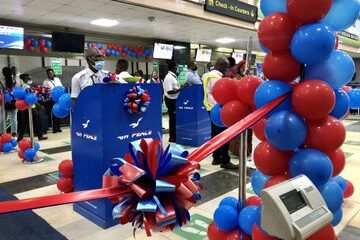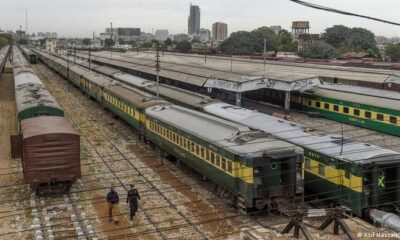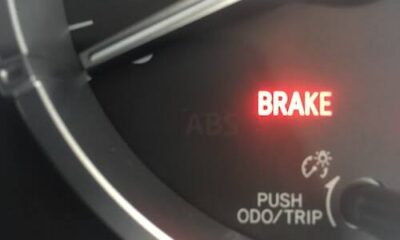AVIATION
Sanusi: Nigeria is Last Frontier for Aviation Investment in the World
In the recently held Dubai Air Show, you collaborated to make a firm order of three Bombardier Q400; what are the details of the partnership?
The three aircraft were purchased by Elin Group Limited, which is a growing, privately owned energy conglomerate with headquarters in Nigeria and footprints across the West African sub-region. They have been in business for some time and they have showed a lot of interest in logistic support for oil and gas. And they have also been into private charter business for a while. So they have showed interest in the logistics support for the ever-growing oil and gas industry, especially for the local oil and gas companies. Aero Contractors came in as support to their foray in the oil and gas sector. This is because we have the experience, the expertise; we also have the manpower to support their vision. So we came up and have an agreement where we will support their fixed wing and most likely their rotary wing also. We are already in collaboration in their rotary wing and their fixed wing operation. So we are there to support them, we are there to provide at least line maintenance and all other logistic support. So it is a partnership that we are very proud of and I believe with the local content, because it is a Nigerian company, and with us with the experience, we will bring it up to a level where they can stand on their own and provide the logistic support for the oil and gas industry.
You have relationship with some oil companies, how are you going to combine supporting them, collaborating with them and also running your own?
The whole thing is a form of support and collaboration between the two companies. Where we cannot provide a service or because we do not have the capacity to provide the equipment, Elin Group has the capacity to provide the equipment and then we have the expertise to support the equipment. So everything is collaboration and everything is supportive. We do have our own market, which we are pursuing. We are concentrating on the rotary wing and that will be complementary to the services that we are going to give to Elin Group. So there is no way we are going to be in competition. So if Aero Contractors cannot or does not have the capacity to provide particular equipment for a particular field, Elin Group will have the capacity to do that. And then we will come in with our experience to support them.
Which aircraft type did Elin Group order?
They ordered Bombardier Q400 Next Generation aircraft, which is the newest of the Q400 or the Dash 8 series. And we have been operating the Dash 8 for a long period of time, since the Dash 6, Dash 8, Dash8-200; Dash8-300 and Dash 8-400. So Aero Contractors has experience in the Dash 8 completely. We have also received the approval of the Nigerian Civil Aviation Authority (NCAA) to maintain the Dash 8 from 200 all the way to 400, all the way to D-check.
How is your scheduled flight operation doing?
We wanted to have five airplanes operating by now, but we are experiencing some delays with one of our aircraft that is undergoing a D-check. But the D-check is almost completed and I believe it will be due for inspection very soon. And I believe we will have four aircraft or five aircraft flying very soon. The operations, as I said, we can keep the operations because we have maintenance facility. So that means we can do C-check, D-check and we can continue to operate the airplanes. But the airplanes will become more expensive because they are old airplanes and to do a D-check will cost about $1.5 to $2 million. So it will be too expensive to do that. We are also looking forward to total fleet renewal, because that is the ultimate way for us to grow. We have stabilised the business, the business is positive and thank God we have the maintenance facility to support the airline.
Acquiring aircraft is very difficult in Nigeria due to finance and even when you get the money, other things make it difficult in Nigeria. So how are you going to go through it if you want to do fleet renewal?
Because of our experience we are looking at all options. We are not looking at only one option; we are looking at leasing, talking to manufacturers, we are looking at also acquiring fairly newer airplanes but used ones. So we have variety of options that we are looking at. Yes, to bring a new airplane into the country is quite challenging; the reason being that the country risk is high. This makes it difficult to even get the financing, because aircraft are quite expensive piece of equipment. To even get a bank to finance, let’s say $40 million or $50 million airplanes is a big risk to take. And, of course, with the antecedent of the aviation industry in the country, most Nigerian banks feel that the risks are too high, especially after the first wave of AMCON (Asset Management Corporation of Nigeria) takeover of airlines. So it becomes a very big challenge to get these banks, to convince them that it is a good venture. But I still believe that the aviation industry in the country, as I had said, is the last frontier for aviation investment in the world. Nigeria is the last frontier for aviation investment in the world. Because look at it, we don’t have very stable formidable carrier that can move our people even within the country without problems. We need airlines that can boast of at least 15 to 20 airplanes that can move to all the 26 airports that we have in the country. That when somebody wants to fly from Lagos to Abuja, he doesn’t start thinking oh, can I get a seat? On a Friday you will be thinking, can I get a seat? No. This is not the way it should be. Flying should be made easy in Nigeria. The five or six million annual passengers traffic that we are looking at in the domestic market can even grow to 10 million. It is very possible. We have not even started looking at low-cost carriers in the country, which also can stimulate the growth of the passengers. As I said, Nigeria is the last frontier for aviation investment in the world, because if you come and invest and you do it right, the market is there, and you will have a lot of opportunities.
Now that there is inadequate aircraft or the number of aircraft available is not meeting the demand, how is it playing out on fares and with Christmas approaching now, what are you expecting?
I think we will see the fares going up again towards the highest filed figures. Because the airlines file their prices with NCAA but the prices that they file are buckets, that is, this is the highest and this is the lowest. So I am predicting that we will see that most of the airlines will be pushing their fares to the highest bucket they have filed. And the NCAA cannot say they should not increase the prices because it is already filed. This is because the demand will be there. The number of aircraft as I said has not been increasing; on the contrary it has been reducing and the demand has been increasing. So it is just a matter of demand and supply, which means that the only way to do it is to increase the prices. So you can see the economy ticket going all the way from N45, 000 to N50, 000 between Lagos to Abuja, for example. Or in some places it can even go to N60, 000 to some remote places in the country where the demands are high. That is the problem and that is what I think we should face. In other countries when festive seasons come that is when you get deals on tickets because they want people to travel. But on the flip side here when the festive season is coming you don’t get the deals, you get higher prices.
How far have you gone in building your maintenance facility and how is the patronage of local airlines?
When we started looking at improving and investing into the maintenance facility, we looked at the reasons why airlines are failing in Nigeria. And the main reason is because we don’t have a formidable maintenance facility in the country to help for simple engine change or simple landing gear change. Then you have to fly it out of the country and that eats up into your profit. So we invested into the maintenance and we are very happy on the progress of the maintenance facility and how far it has gone.
There is no domestic carrier in Nigeria that we are not servicing; we are servicing all of them one way or the other. You know, when something has stopped growing then it is dying, so we intend to keep growing. We have increased our capability; we are looking at putting on the Embraer 145 aircraft on our operational specification. The engineers have done their exams; we are putting the NG (Boeing New Generation airplanes) on our operational specification too. The engineers have finished their exams, so we are putting all that in our capability list to make sure that we cater for almost all the aircraft in the country.
That is one, two we are also looking at modernising the facility. We have just acquired software for the maintenance facility where we are going to digitalise most of our operations. In the next three to four months when you come to our hangar you will not see technicians carrying paper. First they will have a computer, then next you will see them carrying tablets to conduct maintenance task. So, we are rolling out the software in December and we will keep building on that to make sure that we digitalise all our processes to reduce our cost.
Then the next stage is to expand the hangar, that is what we intend to do with the new investors that are coming. Of course you can see the hangar; it can take only one airplane on the side and one plane on the other side. Professional architects have come to look at it and it can take three Boeing 737 NG aircraft and we can take Airbus A320 and one Boeing B767 can go in. so that is what we are looking at. Then the final stage of it is to now upgrade our tooling. We are going to upgrade our tooling; we are going to have the same kind of tooling that is seen in any first class MRO.
It is going to be electronically locked tooling where you will sign in then you can now take the tools and then go and work on the aircraft. That is our final stage and that will be perhaps when we finish the hangar. But the maintenance facility in this country is a must. So for aviation industry to thrive, you must have a maintenance facility to support it. So if you don’t have a maintenance facility to support it no airline will survive. This is because you cannot afford to take your airplane all the time outside the country for maintenance.
-

 AVIATION5 years ago
AVIATION5 years agoPhoto News: Air Peace commence flight operations to South Africa
-

 Car News5 years ago
Car News5 years agoPolestar is recalls over 2000 electric cars due to software bug
-

 Technology5 years ago
Technology5 years agoCommon mistakes in CO₂ emissions calculations
-

 RAIL4 years ago
RAIL4 years ago36 Killed in Pakistan Train Accident
-

 Business5 years ago
Business5 years ago2016 Volvo XC60 review and specifications
-

 Reviews5 years ago
Reviews5 years ago2021 Audi A6 Specifications and Review
-

 SAFETY / CAR CARE5 years ago
SAFETY / CAR CARE5 years agoHandbrake warning light; what it means and what to do
-

 NEWS4 years ago
NEWS4 years agoFG To Spend ₦900 Billion On Fuel Subsidy In 2022
